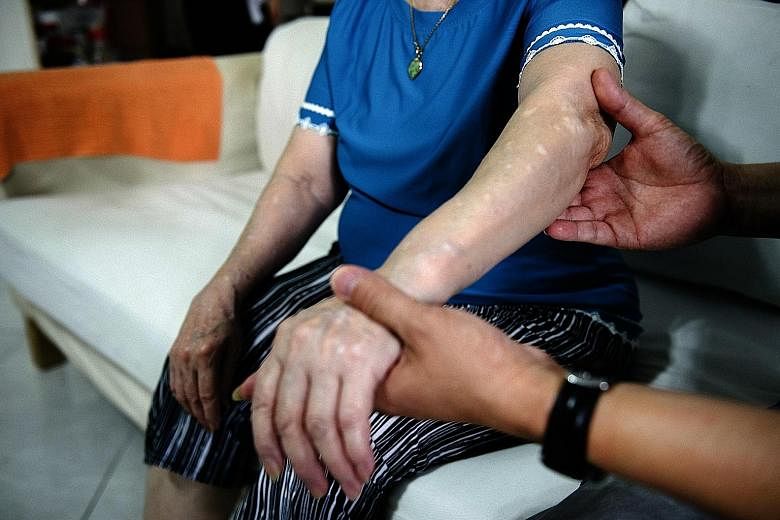Almost every day, numerous insects would swarm and nip at retiree Low Meow Luan's arms and feet, causing an intolerable itch.
The 75-year-old slathered all sorts of ointments and salves, but relief was only temporary. So she clawed at her skin until it bled.
And when the bugs refused to go away, she went to the praying altar of her four-room flat, took out the joss sticks, lit them and pressed the burning tips onto her arms.
"The itch was so agonising that I couldn't eat; I just wanted to sleep it off," said Madam Low, a former dishwasher, of the infestation about seven years ago.
Burning herself with joss sticks "hurt a little", she said in Teochew, but it was better than letting the critters roam freely on her body.
Except that these bugs were not actually real.
Madam Low has delusional parasitosis, a rare condition where people are certain that their bodies are being invaded by insects.
This belief is "strong and unshakeable", said Dr Chan Keen Loong of Khoo Teck Puat Hospital. "They think that they are infested by worms, flies, lice, fleas, mites and other organisms," added the senior consultant in psychiatric medicine.
They might describe it as "torture", talk about it at length and spend a lot of time trying to eradicate the organisms, he added.
The National Skin Centre (NSC), which handles more than 80 per cent of outpatient dermatology cases in the public sector, told The Sunday Times that every year it sees about 15 to 25 patients with delusional parasitosis.
It is generally treated both as a skin and psychiatric condition.
The prevalence of the disorder is unclear, although a 1995 report gauged the incidence in Germany as 1.6 per one million population.
What is known is that it tends to affect people aged 55 and above, and both men and women.
The sufferers exhibit eccentric behaviour, including repeatedly digging or scratching their skin, and using home remedies to exterminate the invisible bugs.
Items used range from hot water, vinegar and medicated oil to caustic chemicals like bleach, hydrogen peroxide and pesticide, said Dr Chan.
A 58-year-old woman in the United States, for example, used a tampon dipped in pesticide.
This was because she believed larvae had crawled into her anus, according to her doctors in a scientific paper published in 2013.
Other patients collect their scabs, skin scrapings, dried blood or hair fragments and "keep them in a plastic bag or container... to convince the doctor that these are the insects that they have dug out from their skin", said Dr Tay Liang Kiat, a consultant dermatologist at Dermatology and Surgery Clinic, a private practice.
Dr Tay said he has seen about 15 to 20 cases of delusional parasitosis in Singapore over the past 10 years.
"I have come across patients who even attempt to destroy their furniture, set fire to their clothes and use kerosene to burn their skin."
It is a difficult condition to treat, he added, as the patients are "totally convinced" that the insects exist.
"Some may even get angry with the suggestion that they have psychiatric issues," said Dr Tay.
"We (doctors) do not outrightly challenge the patients' delusional beliefs; there is a need to be tactful in order to gain their trust."
Such a dilemma applies to Madam Low's case as well.
Her son, renovation contractor Chua Juay Peng, 46, said the elderly woman believes till today that she had been attacked by parasites.
When the itching began, Madam Low visited the polyclinic and traditional Chinese medicine physicians about seven or eight times, but nothing helped. A family friend who is a doctor later suggested that she go to the skin centre in 2011.
By then, her skin condition was quite bad, said Mr Chua, who has four older siblings. "Up until she went to NSC, she had been using the joss sticks on herself for one or two months. We told her to stop, but she would do it secretly - the pain distracted her from the itching."
With treatment, Madam Low's condition improved gradually. Today, she is back to her old self, cooking and doing chores at home, although she still goes for follow-up checks and takes medication daily.
When asked what type of insects bothered her back then, she said she did not manage to see them. "If I don't take the medicine, then they (the insects) will come back."


